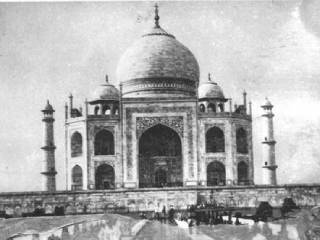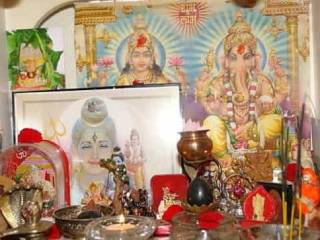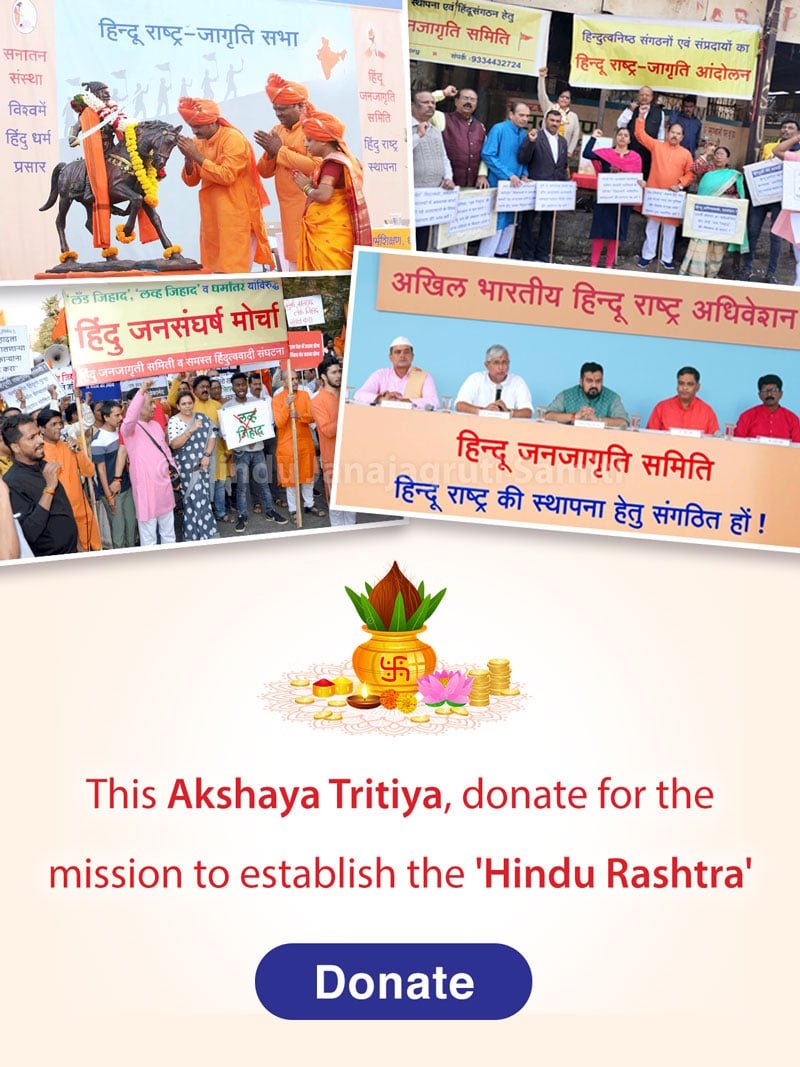‘By education I am an Englishman, by views an internationalist, by culture a
Muslim, and I am a Hindu only by accident of birth’
– Jawaharlal Nehru.
‘The Concept of Hindu Nation’ by Abhas Chatterjee published by Voice of
India, New Delhi in 1995 should be read by all self-respecting Hindus with
fervour and passion. Karl Marx’s Das Capital is an object of worship to all
the Communists round the world. Likewise, in my view, ‘The Concept of Hindu
Nation’ ought to become the object of daily worship to all the Hindus round
the world for secular living with dignity and independence in these troubled
times.
No one can dispute that the traditional homeland of Hindus is the
Bharatavarsha. It is a distinct geographical entity. There are few nations
in the world the natural boundaries of whose homeland are as clearly drawn
as that of ours. And the Hindus have been intimately associated with this
land, lived on it, developed their culture and civilization on it, and
regarded it as sacred soil for at least 6000 years, if not more. When I say
Bharatavarasha in the sense of the Motherland of the Hindus, I do not refer
to the boundaries of the truncated India created by Jinnah, and Nehru in
1947, but to those of our traditional homeland which extends continuously
from Gandhara to Kamrup and from Kashmir to Kanyakumari. This basically has
been the concept of Hindu Nationhood or what we call Hindutva or Hindu
Rashtra from times immemorial.
We remained subjugated for more than 1000 years when foreign rulers ruled
over our country. By barbaric persecution or economic inducements, they
compelled certain segments of our nation to abandon their ancestral culture
and adopt the culture of those foreign invaders. These segments of our
population forgot that the culture they had adopted was a foreign culture, a
culture that belonged to another nation and had been forced on them.
But subjugation cannot by itself destroy the nationhood of a nation. Nor can
the nature of the nation, the basic characteristic and disposition of the
nation, get altered or changed by the fact of enslavement. Nations do not
get destroyed. We Hindus are a nation just as the Germans are a nation, the
Armenians are a nation, the Kurds are a nation, the Jews are a nation.
Germany was divided into two after the II World War. But this did not abate
their nationhood. Within 50 years, they achieved reunification of their
motherland and the nation has been restored to its original character and
complexion.
The fact that ‘WE HINDUS ARE A NATION’ is by no means a new idea. This idea
has been with us from the dawn of history. Without going into the hoary
past, let me trace it from the latter half of the 19th century. If we read
the writings of Swami Dayanand Saraswati of Arya Samaj, we can see the
underlying notion that ‘We Hindus are a Nation’. We can see the same refrain
in the writings of Bankim Chandra Chatterjee of Bande Mataram fame and Sri
Aurobindo. In their writings we find a clear and confident assertion that
‘We Hindus are a Nation’ and not just a religious community. The basic
perception of Vir Savarkar was also the same which he forcefully presented
in his book ‘Hindutva’. However, the saint, sage and seer Swami Vivekananda
made the most powerful pronouncement of this idea. Throughout his brief but
momentous life, Swami Vivekananda proclaimed loudly, clearly and
consistently the fact that ‘We Hindus are a Nation’.
In his brief 5-minute first address, Swami Vivekananda declared at the
inaugural session of the Parliament of Religions at Chicago in 1893: ‘I
thank you in the name of the millions and millions of Hindu people of all
classes and sects’. Then he spoke three sentences which were most
significant. First, he said: ‘I am proud to belong to a Religion which has
taught the world both tolerance and universal acceptance.’ In the second
sentence he said: ‘I am proud to belong to a Nation which has sheltered the
persecuted and the refugees of all religions and all nations of the earth’.
In this context, he cited an example, namely, that when the sacred temple of
the Jews was demolished by the Romans, we Hindus gave shelter to the Jewish
refugees and took care of them in India. In the third sentence, Swamiji
said: ‘I am proud to belong to a Religion which has sheltered and is still
fostering the remnants of the grand Zoroastrian nation’. In these three
consecutive sentences, Swami Vivekananda proclaimed his pride of belonging
first ‘to a religion’, then ‘to a nation’ and again ‘to a religion’.
It will be clear that Swami Vivekananda used the words ‘Religion’ and
‘Nation’ as synonymous terms. No pseudo-secularist in India today can have
any doubt about what religion or nation Swamiji was talking about and what
his perception of nationhood was. Swami Vivekananda is emphatically clear
that the essential feature of Hindu Nationhood is the Hindu religion, the
‘Sanatana Dharma’. He is only declaring ‘We Hindus are a Nation’.
In 1909, Sri Aurobindo expressed the same view in his historic Uttarpara
speech: ‘India is identical with ‘Sanatana Dharma’. When therefore it is
said that India shall rise, it is the ‘Sanatana Dharma’ that shall rise.
When it is said that India shall expand and extend itself, it is the
‘Sanatana Dharma’ that shall expand and extend itself over the world. It is
for the Dharma and by the Dharma that India exists. I say that it is the
‘Sanatana Dharma’ which for us is nationalism’.
The cardinal fact that ‘We Hindus are a Nation’ unto ourselves and not just
a religious community formed the crucial plank of our first national
movement in 1905, viz. the ‘Swadeshi Movement’ in undivided Bengal. When
Bengal was partitioned by Lord Curzon in 1905, the entire Hindu society rose
up with a national inspiration. No one at that time had the slightest doubt
that ‘We Hindus are a Nation’. That is why in Calcutta city, on the first
day of the agitation 50,000 people took a collective oath before Goddess
Kali in the Holy Kalighat Temple to the effect that ‘we shall throw the
British out of our homeland’. The famous historian R.C. Majumdar rightly
concluded that he saw no difference in those days between Sanatana Dharma
and Indian Nationalism.
When Lord Minto conspired and plotted against the Hindu freedom fighters of
Bengal in 1906, he roped in the Muslims under Agah Khan to create the Muslim
League in order to divide the country. The era of Muslim appeasement started
by Lord Minto, reached its climax in 1920 when Mahatma Gandhi became the
Chairman of the Kilafat Movement for the restoration of the Turkish Monarchy
and Empire. Thereafter, at every stage Muslims were appeased by Congress
Leaders and yet they failed to convince Mohammed Ali Jinnah about the need
for the continued existence of a united India even after British withdrawal
from India. It has to be sadly borne in mind that after 1933, Jinnah was
continuously proclaiming ‘We Muslims are a Nation’ till the birth of
Pakistan on August 14, 1947.
After Indian independence, Jawaharlal Nehru promoted his concept of false
nationhood under the label of ‘secularism’. According to this concept, all
the people who happen to reside on the soil of India form a nation, whether
he follows the culture of this country or not, whether he is loyal to this
country or not. It does not matter if the state-aided minorities dismiss the
time-honoured culture of this country ‘Sanatana Dharma’ as abominable and as
a path of the Devil. Thus in a mischievous way Nehru turned the concept of
nationhood into a geographic entity and bade good-bye to the established
principles of nationhood founded on emotional unity and all that it implies.
According to this Nehru’s notion, Hindus of India in majority have to lose
the inheritance of their traditional homeland. Nehru used his political
might to propagate this philosophy and this became the corner stone of all
his policies and proved disastrous for the Hindus.
In 1949, Nehru said that ‘to talk of Hindu culture would injure India’s
interests’. He himself had admitted more than once that by Education he was
an Englishman, by views an internationalist, by culture a Muslim, and a
Hindu only by accidental birth. With all this massive evidence, there is
little scope for doubt that Nehru had total contempt for Hindu religion, for
Hindu culture, for Hindu society and for the average Hindu.
Abhas Chatterjee rightly concludes that this alternate concept of nationhood
as opposed to ‘Sanatana Dharma’, meant State-engineered opposition to the
Hindus in all walks of life. Antagonism to Hindus emerged as the corner
stone of State policy. The ideology of Nehruism came to the lauded,
acclaimed, promoted and propagated under the name ‘Secularism’ till it came
to be treated beyond reproach, beyond debate and beyond discussion. In
short, all the Hindus of India are only disposable condoms.
(To be Concluded)
(The writer is a retired IAS officer)
e-mail the writer at [email protected]

 Mizoram: EC accepts Christians’ demand to defer counting on Sunday, but what if Hindus had made a similar demand?
Mizoram: EC accepts Christians’ demand to defer counting on Sunday, but what if Hindus had made a similar demand? Sign Petition : Immediately repeal the draconian and unconstitutional ‘The Waqf Act, 1995’
Sign Petition : Immediately repeal the draconian and unconstitutional ‘The Waqf Act, 1995’ Shriram : Sri Lanka’s saviour
Shriram : Sri Lanka’s saviour Why it is so cool to malign Hindu gods and goddesses, but it may not be that easy now
Why it is so cool to malign Hindu gods and goddesses, but it may not be that easy now Shocking Truth of Taj Mahal exposed by Late Pujya P. N. Oak
Shocking Truth of Taj Mahal exposed by Late Pujya P. N. Oak How are Hindus treated in states where they are in a minority?
How are Hindus treated in states where they are in a minority?